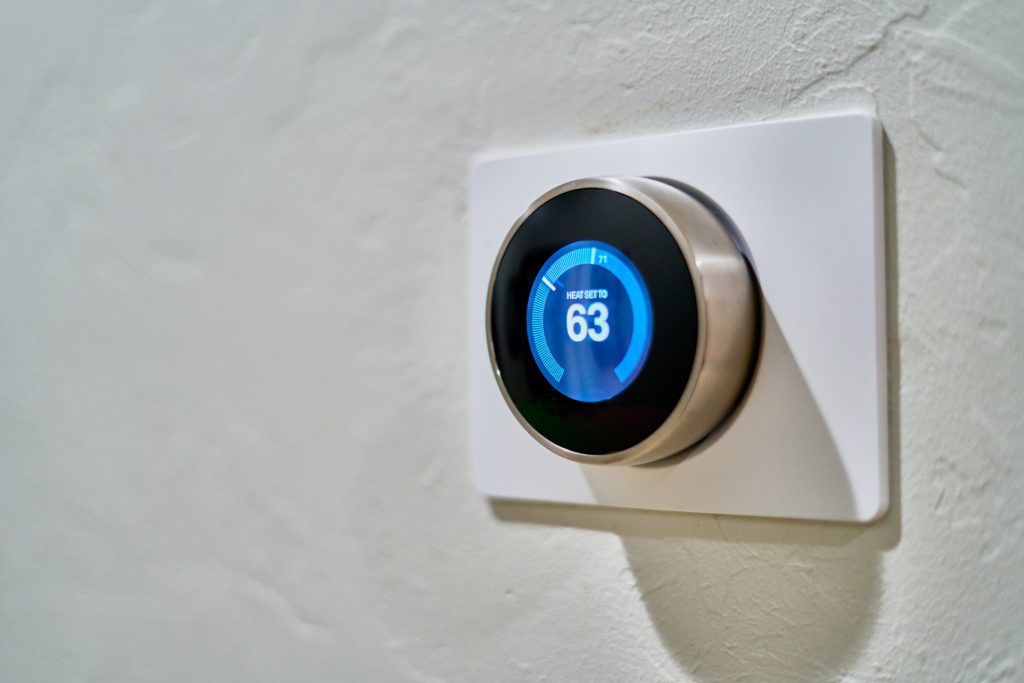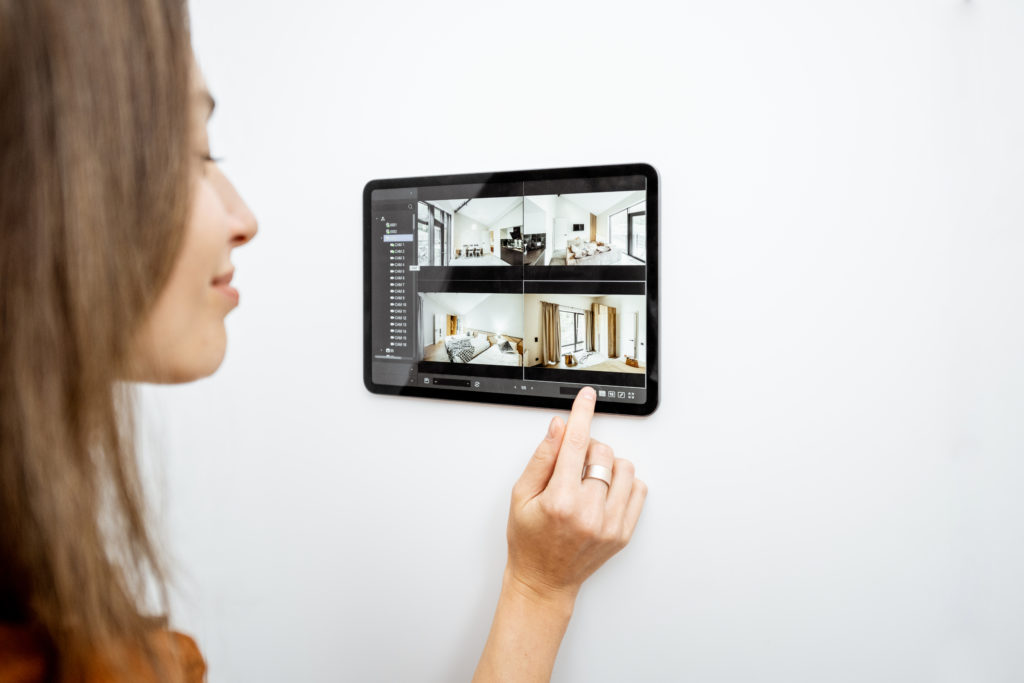- calendar_month July 18, 2021
- folder Industry
The future is here. Smart home technology may seem like something right out of The Jetsons, but these solutions are making life simpler for people today. While these features can be built into homes, you can add many of them to your current home with ease. Here are some of the top trends in Smart Home tech. We’ll also tell you how you can utilize these solutions, and what we predict is coming in the future.
Smart Lighting
One of the most common Smart Home trends is also one of the prettiest: smart lighting. With just a tap or voice command, you can turn your lights on and off, open and close your blinds, and customize the color of your lights. This type of smart home feature has gained a lot of traction over the last few years, likely because it is so simple to integrate. With solutions like the Phillips HUE which is a smart lightbulb or smart outlets that can turn your regular lamps into “smart” lamps, it’s easier than ever to connect your lighting to your phone. Not only does this add convenience (forget about ever having to walk across your dark room after you turn off the lamp) but customization with colorful lights that can set the mood or even change to music.
In the future, we hope to see our smart home systems learn our lighting preferences. Then, based on a time of day or action, the lights and blinds will automatically adjust for us.
Smart Locks
Another Smart Home technology innovation that is becoming widely popular is the smart lock. Connected typically by an app-based tech, you can easily replace most manual door locks with a smart lock. Keyless entry makes life a lot easier when you don’t want to dig through your bag to find a key. It also allows multiple people to easily access the same door without having to make physical key copies. No need to worry that your kid might lose their house key (again); as long as they have their phone with them, they can securely let themselves in. Some smart locks even have a touchpad option, much like you would unlock your phone, if that’s your preference. When away from home, you can check your app to confirm your doors are locked, or see who last unlocked them.
We hope that as technology continues to develop, smart locks add facial recognition technology. Just like iPhones that have Face ID, we could unlock our door as soon as we walk up to it, hands-free. Wouldn’t that feel like something right out of a spy movie?
Smart Thermostats
Photo by Dan LeFebvre on Unsplash.com
Smart thermostats are great because they don’t simply control your home’s temperature, but they can also save you money on your utilities bill. Sure, smart thermostats can be controlled when you are sitting on your couch and too chilly to get up from the blanket you’re under to turn on the heat. But they can also be controlled when you are out of the house as well. On your way home from work on a sweltering hot day? Get your AC running ahead of time so it’s nice and cool when you walk in the door, by just opening your app. Some systems even have the ability to detect whether someone has left the room and automatically turn it off to save energy, which is pretty incredible! You can install smart thermostats to most home central heating and AC systems with ease and no expert installations required.
One way this technology may improve soon is by not only learning when someone is in or out of a room but what that person’s temperature preferences are based on the time of day and temperature outside. That would keep our homes automatically comfortable for us all day long in every room!
Smart Home Security Systems
Photo by Ross Helen via Envato Elements
One of the first no-brainer smart technology advancements that people began to integrate into their homes was for security. Now instead of just an automatic light over your garage, you can have a Ring doorbell with a camera and a microphone that you can “answer” even if you aren’t at home. Many traditional home alarm companies like ADT have even adapted now to have your alarm controlled from your devices. The set-up is a simple DIY and the surveillance is accessible to you 24/7. This makes it a great alternative to ordinary home security systems. However, there are still many concerns about the true security of these security systems. Many of these cameras can be hacked without you knowing.
We hope that as technology progresses, home security doesn’t just secure our physical home but our data as well. Right now, consumers bear the burden of not getting hacked. We hope that tech companies can provide solutions for the security and privacy of video feeds and other important information.
Home Device Integration & Connectivity
Photo by Thought Catalog on Unsplash.com
Smart home assistants like Amazon Alexa and Google Nest provide the ultimate hub for all smart home functionality. If you have more than one smart device, it’s crucial to get a smart home unit to manage them for you, so all you have to do is ask and it will be done! Not only can your smart assistant control your lights, music, locks, and thermostat, but it can provide a plethora of other useful functions, such as setting timers, converting measurements, telling you the weather and the latest news, texting your friends for you, making a grocery list, and even playing games with you.
Smart home assistants are extremely useful and truly make it feel like your home is fully “smart” and futuristic. We hope that advancements include further integration and connectivity to more devices and apps. AI should be advanced so when asking questions, it feels more like speaking to a real person instead of a robot. It would also be great to have some offline functionality so that if your Wi-Fi goes out temporarily (let’s hope not), everything isn’t stuck.
What Smart Home Technology We Anticipate Seeing in the Future
The future of smart home technology is bright and is constantly changing and improving. We anticipate machine learning being utilized more to provide better experiences for people. When our devices can learn what we like and anticipate what we want, our lives get a little simpler.
Network improvements
With 5G networks expanding and becoming more available, faster network speeds will make connectivity better, and will overall improve the performance of smart devices. With that will come the improvement of the IoT (Internet of Things), which is crucial since more and more devices will become “smart” devices in the future; a few years from now, every appliance in your kitchen could likely be online.
Smart Healthcare
One of the most important smart home developments that we will likely see is home healthcare. With the announcement of the health features of the Series 6 Apple Watch, more tech companies will likely be partnering with healthcare companies to provide monitoring in your home- perhaps a pillow reading your vitals when you’re sleeping or gym equipment that can call an ambulance in case of injury. Could a smart toothbrush tell us when it’s time to go to the dentist? Could a smart toilet tell us when we need more vitamins? Perhaps technology could help us live our healthiest lives yet, and prevent injury and fatalities by monitoring our wellbeing while at home.
Robots
Lastly, we predict there will be robots in our homes. Sure, many of us already have robot vacuums, but maybe we will see more robotic solutions to simple household chores or cooking. Although we don’t anticipate humanoid robots in our home like something out of a Sci-Fi movie, maybe it would be kind of nice to have a robot companion who cleans for us like Rosie from The Jetsons.
What do you think is the next big trend in smart home technology? How many smart devices do you have in your home?



